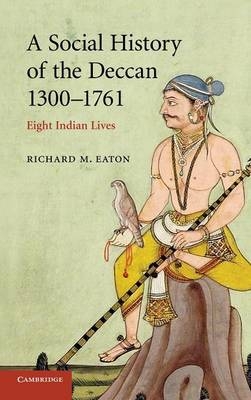
A Social History of the Deccan, 1300–1761
Eight Indian Lives
Seiten
2005
Cambridge University Press (Verlag)
978-0-521-25484-7 (ISBN)
Cambridge University Press (Verlag)
978-0-521-25484-7 (ISBN)
Richard Eaton recounts the history of the Deccan plateau, vividly, through the lives of eight Indians who each represented something particular about the region. Their stories are woven together into a rich narrative tapestry, which illumines the most important social processes of the Deccan across four centuries.
In this fascinating account of one of the least known parts of South Asia, Eaton recounts the history of the Deccan plateau in southern India from the fourteenth century to the rise of European colonialism. He does so, vividly, through the lives of eight Indians who lived at different times during this period, and who each represented something particular about the Deccan. In the first chapter, for example, the author describes the demise of the regional kingdom through the life of a maharaja. In the second, a Sufi sheikh illustrates Muslim piety and state authority. Other characters include a merchant, a general, a slave, a poet, a bandit and a female pawnbroker. Their stories are woven together into a rich narrative tapestry, which illumines the most important social processes of the Deccan across four centuries. This is a much-needed book by the most highly regarded scholar in the field.
In this fascinating account of one of the least known parts of South Asia, Eaton recounts the history of the Deccan plateau in southern India from the fourteenth century to the rise of European colonialism. He does so, vividly, through the lives of eight Indians who lived at different times during this period, and who each represented something particular about the Deccan. In the first chapter, for example, the author describes the demise of the regional kingdom through the life of a maharaja. In the second, a Sufi sheikh illustrates Muslim piety and state authority. Other characters include a merchant, a general, a slave, a poet, a bandit and a female pawnbroker. Their stories are woven together into a rich narrative tapestry, which illumines the most important social processes of the Deccan across four centuries. This is a much-needed book by the most highly regarded scholar in the field.
Richard Eaton is one of the premier scholars of pre-colonial India. His many publications include The Rise of Islam and the Bengal Frontier, 1204–1760 (1993), India's Islamic Traditions, 711–1750 (2003) and Temple Desecration and Muslim States in Medieval India (2004).
1. Pratapa Rudra (c.1289–1323); 2. Muhammad Gisu Daraz (1321–1421); 3. Mahmud Gawan (1411–81); 4. Rama Raya (1484–1565); 5. Malik Ambar (1548–1626); 6. Tukuram (1608–49); 7. Papadu (1695–1710); 8. Tarabai (1675–1761).
| Erscheint lt. Verlag | 17.11.2005 |
|---|---|
| Reihe/Serie | The New Cambridge History of India |
| Zusatzinfo | 3 Tables, unspecified; 16 Plates, color; 6 Maps |
| Verlagsort | Cambridge |
| Sprache | englisch |
| Maße | 164 x 236 mm |
| Gewicht | 570 g |
| Themenwelt | Geisteswissenschaften ► Geschichte ► Regional- / Ländergeschichte |
| ISBN-10 | 0-521-25484-1 / 0521254841 |
| ISBN-13 | 978-0-521-25484-7 / 9780521254847 |
| Zustand | Neuware |
| Haben Sie eine Frage zum Produkt? |
Mehr entdecken
aus dem Bereich
aus dem Bereich
Universalgelehrter, Polarreisender, Entdecker
Buch | Hardcover (2024)
mareverlag
28,00 €


